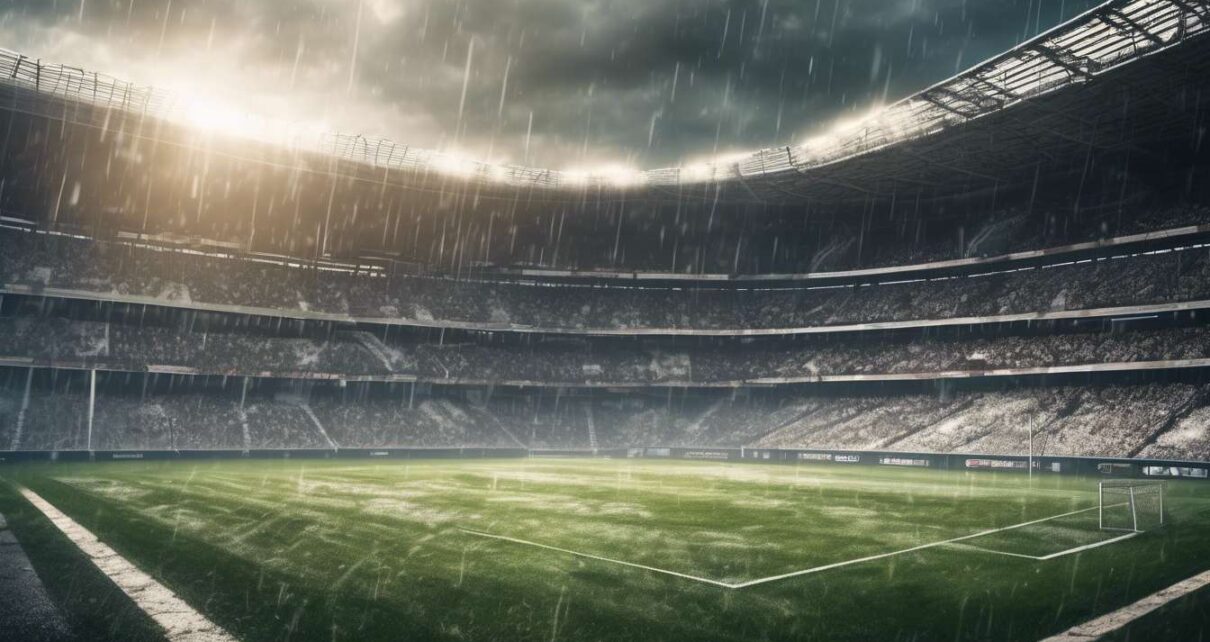In the world of football betting, we often find ourselves analyzing a myriad of factors to make informed decisions. Among these, weather plays a surprisingly pivotal role, influencing not only the outcome of matches but also the strategies we employ in our betting endeavors.
As enthusiasts and analysts, we delve into the intricate relationship between weather conditions and game performance, seeking patterns and insights that could give us an edge. Whether it’s the sweltering heat of a summer match or the unpredictable elements of a winter game, each weather condition brings unique challenges and opportunities.
Key Weather Impacts:
-
Rain: Transforms a pitch into a slippery battlefield, affecting ball control and player footing.
-
Wind: Turns long passes into unpredictable gambles, complicating aerial play and influencing scoring chances.
By understanding these dynamics, we aim to refine our predictions and enhance our understanding of how weather impacts not just the players on the field, but also the odds and outcomes we wager on.
Rain’s Impact on Gameplay
Rain significantly alters gameplay by making the field slippery and affecting players’ traction. When we watch a match under these conditions, we’re reminded of how weather can reshape the dynamics on the field.
- Players slip
- Passes go astray
- Unexpected outcomes become more likely
As passionate fans and analysts, we know that rain challenges a team’s performance and demands quick adaptation to new strategies.
In rainy conditions, we often see players struggle with ball control, leading to changes in how the game is played.
Teams might:
- Opt for a more ground-based strategy to maintain possession
- Minimize long passes that could be easily misjudged
Defensive strategies become crucial as they adapt to anticipate slips or missteps.
Understanding these shifts helps us feel more connected to the game. As we analyze the impact of rain, we’re not just observing; we’re part of a collective effort to grasp how weather influences performance and strategy.
Wind’s Influence on Strategy
Strong winds can dramatically alter a team’s approach on the field, demanding adaptability in both passing and positioning. When weather conditions introduce gusty challenges, our strategy must evolve to maintain optimal performance.
Passing Adjustments:
- Short, grounded passes might replace long aerial ones.
- This ensures control is retained against the wind’s unpredictability.
Positioning Adjustments:
- Players often adjust their positioning to either exploit or shield against the wind.
- Defensive lines might tighten.
- Attackers may look for opportunities to use the wind’s force to their advantage.
For fans and bettors, understanding these shifts can provide an edge. Our collective insights into these weather-driven strategies can make all the difference.
By analyzing how teams adapt to windy conditions, we can better predict performance outcomes. It’s not just about reacting; it’s about anticipating and strategizing, ensuring we’re always a step ahead in our football betting endeavors.
Snow’s Effect on Performance
Snow can significantly disrupt a football game by slowing down play and affecting players’ agility. We’ve all seen how this type of weather can turn a well-prepared strategy upside down. When snow blankets the field, it becomes a challenge for teams to maintain their usual performance levels. Players struggle with footing, limiting their speed and quick movements.
Strategy becomes crucial in snowy conditions. The team that adapts its game plan effectively often comes out on top. This requires adjustments such as:
- Short passes replacing long throws
- Running plays taking precedence over aerial tactics
Weather challenges test both physical and mental resilience. We must consider how our favorite teams adjust their strategies. It’s about anticipating how our team, our community, will thrive under the challenge and emerge victorious, despite the elements.
For fans, understanding how snow impacts performance can deepen our connection to the game. It highlights the importance of strategic flexibility and resilience, adding another layer of excitement as we watch teams adapt and overcome the challenges presented by snowy conditions.
Heat’s Role in Endurance
In intense heat, players’ endurance is put to the test, demanding not only physical stamina but also strategic hydration and pace management. We’ve all seen how weather can dramatically influence the outcome of a match. When the sun blazes relentlessly, it isn’t just about who’s physically stronger; it’s about smart strategy and teamwork.
Together, we need to recognize how players’ performance can shift, affecting the dynamics of the game and, consequently, our betting decisions.
Our shared understanding of these factors can create a sense of community among us, as we discuss and analyze how heat impacts performance. We can observe how teams adjust their strategies, opting for slower, more controlled play to conserve energy.
This shared knowledge empowers us to predict potential outcomes more accurately, aligning our insights with the realities of the field.
Let’s embrace this collective wisdom and enhance our strategies, ensuring that we’re always one step ahead when placing our bets.
Fog’s Disruptive Potential
Fog can obscure our vision, causing unpredictable shifts in gameplay that challenge both players and bettors alike. When the weather takes a foggy turn, we find ourselves grappling with reduced visibility, which can dramatically alter the performance on the field. Players might struggle to gauge distances accurately, leading to more mistakes and unexpected outcomes.
This uncertainty makes our betting strategies more complex, as traditional performance metrics might not hold up under these conditions.
As a community of passionate bettors, we need to adapt and adjust our strategies to accommodate the fog’s disruptive potential. It’s crucial that we consider how teams historically perform in such weather. Some teams might have developed specialized strategies to cope with foggy conditions, leveraging short passes and close-quarter play that minimize errors.
By understanding these nuances, we can better predict outcomes and place more informed bets. Together, we can navigate the challenges fog presents, turning potential disruption into strategic opportunities.
Cold Weather’s Tactical Shifts
In cold weather, players often adjust their tactics to maintain performance and minimize injury risks. Teams adapt their strategy by focusing more on ground play rather than aerial maneuvers.
- The slippery turf and icy conditions can make high balls unpredictable.
- Keeping the play low and direct ensures better control.
Cold weather affects performance in other ways as well. Players wear extra layers or thermal gear to stay warm, which can slightly impact agility.
- This change in attire can influence speed and movement, prompting teams to modify their strategy accordingly.
- Short, quick passes become more frequent as they help maintain possession and conserve energy.
Additionally, the ball behaves differently in cold conditions—it becomes harder and less responsive.
- Players might opt for controlled, precise passes to maintain accuracy.
As part of our community, understanding these shifts helps us appreciate how teams adapt to weather challenges. This knowledge makes us more informed when predicting outcomes in football betting.
Humidity’s Stamina Challenge
High humidity can sap players’ stamina, making endurance a crucial factor in football matches. When the weather’s muggy, teams often struggle to maintain their usual performance levels. This shared challenge can unite fans and bettors, as everyone looks for strategies to predict outcomes more accurately.
In these conditions:
- Players tire faster.
- Movements may become sluggish.
- Favorite teams might not play as dynamically, affecting the game’s tempo and betting predictions.
To tackle this, we need a strategy that appreciates how weather impacts performance:
-
Adaptation of Play Style:
- Teams that adjust their play style to conserve energy may have an advantage.
-
Squads with Deeper Benches:
- Teams capable of rotating players can sustain high energy levels throughout the match.
-
Historical Analysis:
- Analyzing past games played in similar conditions can provide insights into how teams have coped previously.
By considering these factors, we can enhance our understanding and foster a sense of community within the betting world.
Extreme Weather’s Betting Considerations
Severe weather conditions can dramatically influence football match outcomes and alter betting strategies.
As a community of bettors, we must stay vigilant. When extreme weather, such as heavy rain, snow, or wind, comes into play, it can disrupt team performance and expectations. Players might struggle with footing and ball control in rain or snow, while strong winds can affect passing and shooting accuracy.
Our strategy should adapt accordingly.
We recognize that:
- Teams specializing in ground play might face challenges in wet conditions.
- Teams comfortable with aerial tactics may find windy weather a hindrance.
Moreover, our insights should consider how weather impacts home advantage.
- Teams accustomed to specific weather conditions might outperform those less familiar, affecting our betting decisions.
By integrating weather analysis into our betting strategy, we enhance our understanding of potential game outcomes.
Together, let’s leverage these insights to make informed bets, turning extreme conditions into opportunities for success.
How do weather conditions affect the odds set by bookmakers in football betting?
Weather conditions play a crucial role in influencing bookmakers when setting odds for football matches.
Factors affecting gameplay include:
- Rain
- Wind
- Extreme temperatures
These conditions can impact the outcome of a game and affect players’ performance.
Bookmakers’ adjustments:
- They take these variables into account to adjust the odds accordingly.
- The adjustments reflect the potential impact of weather on the match.
Benefits of understanding weather impacts:
- Provides valuable insights into predicting outcomes.
- Assists in making informed betting decisions.
Understanding how weather affects gameplay can enhance your betting strategy.
What tools or resources are available for bettors to track weather forecasts relevant to football matches?
We use various tools to track weather forecasts for football matches. Websites like Weather.com and AccuWeather provide detailed updates on conditions.
Many sports betting apps also include weather information. By staying informed, we can make more strategic decisions when placing bets.
It’s important to consider how weather might impact a game and adjust our predictions accordingly.
Keeping an eye on the forecast gives us an edge in our betting strategy.
How do historical weather patterns influence long-term football betting strategies?
Historical weather patterns play a crucial role in shaping our long-term football betting strategies.
By analyzing past weather conditions, we can:
- Identify trends and patterns
- Make more informed decisions when placing bets
Understanding how weather has impacted games in the past allows us to:
- Adjust our strategies accordingly
- Increase our chances of success
It’s a key factor that we always consider when developing our betting approach.
Conclusion
In conclusion, when it comes to football betting, don’t overlook the weather’s impact on the game. Various weather conditions can significantly influence gameplay and outcomes.
Key weather factors to consider include:
- Rain
- Wind
- Snow
- Heat
- Fog
- Cold
- Humidity
Understanding how these conditions affect teams and players can give you an edge in making informed bets.
So, next time you’re considering placing a wager, take a moment to check the forecast and factor in the weather to increase your chances of success.




